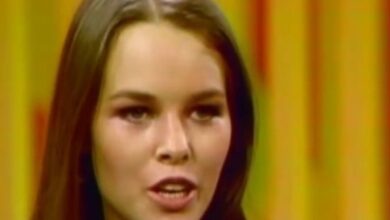Elvis Presley Sparks a Rock & Roll Revival with “Burning Love” in 1972
Elvis Presley’s release of Burning Love in 1972 marked a thrilling chapter during the later stages of his storied career, signaling his enduring dominance in the world of rock music. Emerging at a time when many questioned whether Presley could still command the spotlight, the track catapulted up the Billboard Hot 100 and landed firmly at number two, testifying to his unyielding appeal. Even with the landscape of rock having changed so much since his debut, Presley proved he could still capture an audience with his unmistakable energy and iconic vocals.
Throughout the early seventies, Elvis had already established himself as a transformative figure in the evolution of popular music. His innovative blend of rhythm and blues, gospel, and country gave him a unique voice and an unmatched presence in the industry. After the seismic impact of his 1950s hits and his cinematic focus in the sixties, his career had taken on a more lavish tone, defined by glittering Vegas residencies and showstopping ballads. Many fans and critics wondered if the wild, electrifying side of Presley would ever return to center stage.
The arrival of Burning Love, written by Dennis Linde, answered those questions with authority. Although Linde originally recorded the tune, Presley’s dynamic interpretation breathed new life into the song. Elvis transformed it into a blistering, high-octane anthem about desire and passion, infusing the lyrics with a raw, fevered intensity. His interpretation brought out both the urgency and the uncontainable excitement buried in the music, elevating the song far beyond its original form.
The recording session for Burning Love took place on March 28, 1972, at RCA Studios in Hollywood, under the careful supervision of producer Felton Jarvis. Elvis was surrounded by top-tier musicians, with James Burton leading on guitar, Glen D. Hardin at the piano, and Ronnie Tutt propelling the rhythm with his drums. Dennis Linde himself contributed on rhythm guitar, preserving the spirit of his composition. The session was marked by a tight, energetic sound, echoing the drive of Presley’s early hits and giving the track its enduring fire.
When Burning Love finally hit the airwaves, the reaction was instantaneous and overwhelmingly positive. It quickly became Presley’s most prominent rock single in years, bringing his name back into serious rotation on the charts at a time when acts like The Rolling Stones and Led Zeppelin reigned supreme. While it narrowly missed topping the Billboard Hot 100, its peak at number two was a testament to Elvis’s cross-generational impact and the timelessness of his music. The single also resonated on country charts, a reminder of Presley’s extraordinary versatility and broad appeal.
Beyond the numbers, Burning Love reignited the spirit of the high-energy rock that had been a hallmark of Presley’s earlier career. In stark contrast to the slower, more theatrical ballads of his Vegas era, this song recalled the wildness and vitality of his youth, mesmerizing audiences once again with its electrifying performance style. Presley’s delivery, brimming with intensity, reminded both old fans and new listeners that he was still a force to be reckoned with.
Following the revival spurred by Burning Love, excitement for Elvis’s rock roots was rekindled among fans and critics alike. While he would continue to perform and record prolifically, this song stood out as one of the final high-voltage rock moments of his career before his untimely death in 1977. Each live performance of the song became an event in itself, with Presley pouring every ounce of his charisma and energy into every note.
The legacy of Burning Love only grew as years went by, as musicians from many genres paid tribute with their own covers. Its infectious beat and soaring vocals made it adaptable to a variety of styles, ensuring its relevance for new generations of listeners. The track’s appeal stretched far beyond its original rock framework, reinforcing its place as a cultural and musical touchstone.
Among the most memorable live renditions was Presley’s legendary Aloha from Hawaii concert in 1973, a global broadcast that showcased his unparalleled command as a live performer. Clad in his iconic white jumpsuit, Elvis delivered a rousing version of Burning Love to millions, further embedding the song into the fabric of his mythic career and leaving a lasting impression on all who watched.
Decades later, Burning Love remains one of the most celebrated entries in Presley’s vast catalogue. Regularly appearing in best-of collections, retrospectives, films, and TV series, it embodies the fiery spirit and enduring allure of the King of Rock & Roll. No matter how much the music world evolves, the song continues to inspire, excite, and remind us why Presley’s influence is so enduring.
Ultimately, Burning Love endures as Elvis Presley’s final great rock anthem—a high-energy masterpiece capturing all the qualities that defined his rise and sustained his legend. Its unforgettable chorus, driving rhythm, and impassioned vocals serve as a reminder that, even in his later years, Presley never lost the fire that made him an icon.





